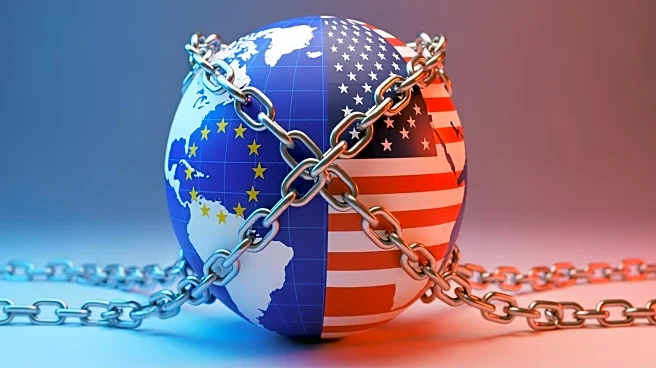What's Happening?
The European Union has joined the United States in imposing new economic sanctions on Russia, targeting its oil industry and financial sector. This coordinated effort aims to cut off revenue that funds Russia's military operations in Ukraine and force
President Vladimir Putin to negotiate an end to the conflict. Ukrainian President Volodymyr Zelenskyy has welcomed the sanctions, viewing them as a significant step towards holding Russia accountable for its actions. The sanctions come amid ongoing concerns about Russia's military activities and the threat they pose to regional stability.
Why It's Important?
The imposition of sanctions by both the EU and the US represents a unified stance against Russia's aggression, potentially increasing pressure on Moscow to engage in peace talks. These measures could significantly impact Russia's economy, particularly its energy sector, which is vital for funding military operations. The sanctions may also influence global energy markets, as restrictions on Russian oil and gas could lead to shifts in supply and demand. The international community's response to Russia's actions may set a precedent for addressing similar conflicts in the future.
What's Next?
The effectiveness of the sanctions in compelling Russia to negotiate remains to be seen, as Moscow has historically been adept at circumventing such measures. The EU and US may need to consider additional strategies to ensure compliance and prevent Russia from sidestepping the sanctions. Diplomatic efforts to resolve the conflict will likely continue, with stakeholders exploring alternative avenues for negotiation. The situation may also prompt discussions on the role of economic sanctions in international diplomacy and their impact on achieving peace.
Beyond the Headlines
The sanctions highlight the complex interplay between economic measures and geopolitical strategy, raising questions about their long-term impact on global relations. The use of sanctions as a tool for conflict resolution may lead to unintended consequences, such as increased nationalism or retaliatory actions. This approach underscores the need for comprehensive strategies that balance economic pressure with diplomatic engagement to achieve sustainable peace.

















